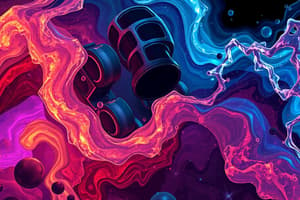Podcast
Questions and Answers
What kind of mixture is salt water?
What kind of mixture is salt water?
- Homogeneous mixture (correct)
- Heterogeneous mixture
- Compound
- Element
Breaking down water molecules into Hydrogen and Oxygen gas is what type of change?
Breaking down water molecules into Hydrogen and Oxygen gas is what type of change?
Chemical change
What are the four states of matter?
What are the four states of matter?
Solid, Liquid, Gas, Plasma
What are the two ways of separating a mixture?
What are the two ways of separating a mixture?
What is the difference between physical and chemical change?
What is the difference between physical and chemical change?
What does homogeneous mean?
What does homogeneous mean?
What change occurs between an element and a compound?
What change occurs between an element and a compound?
List 3 examples of homogeneous & heterogeneous mixtures.
List 3 examples of homogeneous & heterogeneous mixtures.
When sand is compressed to form glass, is that a physical or chemical change? Why?
When sand is compressed to form glass, is that a physical or chemical change? Why?
What type of change is from pure substance to mixture?
What type of change is from pure substance to mixture?
Define compound.
Define compound.
When you add food coloring to water and stir, is this a physical or chemical change?
When you add food coloring to water and stir, is this a physical or chemical change?
What change occurs between a heterogeneous and homogenous mixture?
What change occurs between a heterogeneous and homogenous mixture?
Define element.
Define element.
Name some typical physical properties.
Name some typical physical properties.
When gunpowder explodes, is it a physical or chemical change?
When gunpowder explodes, is it a physical or chemical change?
What is a pure substance?
What is a pure substance?
Define mixture.
Define mixture.
Explain why ramen and cookies are considered heterogeneous mixtures.
Explain why ramen and cookies are considered heterogeneous mixtures.
What's the process of distillation?
What's the process of distillation?
What's the difference between chemical and physical change?
What's the difference between chemical and physical change?
What is the process of filtration?
What is the process of filtration?
A blueberry muffin is a heterogeneous mixture. Why?
A blueberry muffin is a heterogeneous mixture. Why?
How might one separate dissolved salt from water? Why does this work?
How might one separate dissolved salt from water? Why does this work?
Flashcards are hidden until you start studying
Study Notes
Mixtures and States of Matter
- Salt water is classified as a homogeneous mixture, where salt is uniformly dispersed in water.
- The four states of matter are solid, liquid, gas, and plasma.
- Homogeneous mixtures include juice, salt water, and air; heterogeneous mixtures include cookies, ramen, and sand mixed with water.
- In heterogeneous mixtures, different regions exhibit varying properties, making components easily separable.
Changes in Matter
- Breaking down water into hydrogen and oxygen represents a chemical change, altering the substance's fundamental structure.
- Changing the state of an element or compound involves a physical change, with no alteration in chemical composition.
- Glass formed from compressed sand demonstrates a physical change, as the chemical identity of sand remains intact despite the transformation.
Differences Between Changes
- A physical change affects the appearance or state of matter without altering its identity, while a chemical change creates new substances through the alteration of atomic structure.
- The process of distillation involves heating mixtures to separate components based on differences in boiling points, resulting in vaporization and condensation.
- Filtration uses a barrier (filter) to separate heterogeneous mixtures, retaining larger particles while allowing smaller ones to pass through.
Pure Substances and Compounds
- A pure substance is defined as having a fixed composition without variation in its makeup.
- Compounds consist of two or more elements that maintain a consistent elemental ratio.
- Elements cannot be broken down into simpler substances through chemical methods and serve as fundamental building blocks for compounds and mixtures.
Observing Changes
- Adding food coloring to water represents a physical change, as the water's chemical structure remains unchanged despite the alteration in color.
- Gunpowder exploding is a chemical change, characterized by the formation of new substances as a result of the reaction.
- The transition from a pure substance to a mixture is a chemical change due to the alterations in composition.
Understanding Physical Properties
- Typical physical properties include smell, color, and state, which describe the observable characteristics of a substance.
- Changes between heterogeneous and homogeneous mixtures involve physical changes, as molecular structures do not change.
Special Considerations
- Ramen and cookies are classified as heterogeneous due to the non-uniform distribution of their components, which can be physically separated.
- The separation of dissolved salt from water can be accomplished by evaporation, allowing the solid salt to remain while the water transitions to gas.
Studying That Suits You
Use AI to generate personalized quizzes and flashcards to suit your learning preferences.




